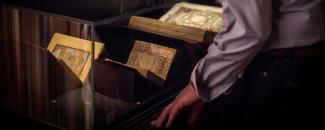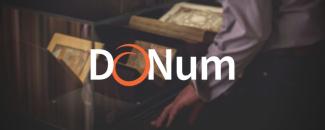Preservation policy
‘Preserve less, but preserve better’. This summarises ULiège Library’s position and priorities. While it has long been attached to the idea of preserving all documents, ULiège Library’s policy is now adapting to the evolution of the world of documentation.
The preservation challenge
For several years, ULiège Library has carried out a discussion on its preservation policy, which is regularly adapted to changes in the world of documentation. For a long time, the university libraries have tried to conserve the most extensive collections possible. This perspective, which was aimed at self-sufficiency, is no longer justified today and the preservation of all documents is no longer systematically applied. ULiège Library has determined a few key areas in which to focus its resources:
- documents related to teaching and research carried out within the University;
- ULiège scientific production;
- documents related to the rich industrial past and history of the region;
- etc.
Shared preservation
To this end, ULiège Library takes part in the French Community of Belgium's (BICfB CPP group) program 'Conservation Partagée des Périodiques entre universités' (Shared conservation of periodicals between universities). An internal structure, which aims to manage and streamline the former periodical collections (Gevafa cell), has also been put in place. These two structures pursue the same goal: to streamline the conservation of documents using a collaborative model.
Material conservation
For several years, ULiège Library has carried out a discussion on – and dedicated resources to – the development of a material-preservation policy for documents that is both preventive and curative. This policy essentially comprises:
- improving conservation conditions;
- operations to maintain the collections, in order to improve document hygiene;
- binding and conditioning campaigns for collections of periodicals;
- conditioning damaged documents;
- conservation and restoration work on old documents.
Document digitisation is also an integral part of the material-conservation policy for old collections.
Contact : Cécile Oger
Digitisation policy
Although ULiège Library houses a rich and diverse patrimonial collection, it is not jealously guarded. On the contrary, since it is considered to be our shared heritage, ULiège Library is trying to make it accessible to as many people as possible in digital form. Digitisation projects have been carried out for several years, with various goals.
A need from the users
Where there are limitations related to a physical document (opening times of the place of consultation, limited number of available copies), digitisation offers solutions. The online publication of a digital version of our documents on DONum (Dépôt d’Objects Numérisés, or Digitised Objects Repository) increases their accessibility: they are now accessible to an unlimited number of readers, from anywhere and at any time.
Digitisation offers greater flexibility and adaptability when accessing documentary resources.
A large share of digitisation projects are launched by the user. ULiège Library is open to any suggestions regarding the digitisation of its collections, but also analyses data concerning the consultation of its physical documents in order to build its digitisation projects. Digital versions of necessary or useful documents for the public are offered online on the basis of priority.


